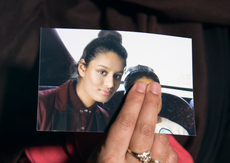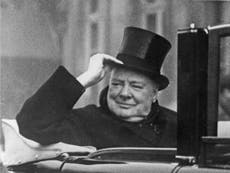Arguing whether Winston Churchill or Shamima Begum are ‘the bad guys’ makes fools out of us all
If we can just grit our teeth and engage with the parts of someone’s story that conflict with the conclusion we’re drawn to, then our convictions will be gripped with that much more confidence

Just for fun, imagine that parliament is six weeks away from a cliff-edge deadline, and desperately scrabbling to untie and retie a constitutional Gordian knot in such a way that it might hold the country together. What is the one question that you’d most like to ask the shadow chancellor? Is it: Winston Churchill – hero or villain? Me too, and thankfully we’re in luck, because someone has asked John McDonnell exactly that and now it’s all that anyone can talk about. Phew – crisis averted.
McDonnell’s answer – “Tonypandy. Villain.” – has had some people passionately applauding, others spitting in outrage, and perhaps a handful wondering whether they’d missed a new show on CBeebies. For those in the last group, it's the site of a miners’ strike that turned violent in 1910, with one miner killed and hundreds of citizens injured. As the home secretary when armed troops were sent in, Churchill’s role is controversial to say the least.
Far be it from me to suggest that, with rumours swirling about the possibility of yet another general election, it might not have been the absolute best time for McDonnell to be airing his most divisive views. What I take issue with is not the answer but the question.
Why are we so keen to categorise historic figures as hero or villain, monster or messiah, saintly chalk or satanic cheese? These iconic men and women are, like the rest of us, complex. Is it not also quite likely that the ramifications of those complexities were magnified by the power they held? After all, if Churchill had been a local councillor, he might only have been remembered as a tireless and charismatic campaigner on the bin front who had the unfortunate capacity to make things a bit tense if conversation wasn’t carefully steered away from “the bloody Kurds”. Because he held high office, he’s either the hero who mobilised a nation to face down the Nazi threat, or the chemical-weapon-flinging, giant-baby-resembling, white supremacist villain of Tonypandy. Or – you know, if we’re honest – a perplexing mishmash of all of those things and more.
It’s not just Churchill who’s divisive, of course. A statue of Oliver Cromwell has stood outside the House of Commons for over a century, raising controversy from the start. To some, Cromwell is the heroic champion of liberty who laid the ground for our modern parliamentary democracy; to others, he’s the villainous reprobate who laid the ground for our modern parliamentary democracy. I’m not a historian, but again the truth may very well contain elements of both.
It’s not just historical figures either. Andrew Lloyd-Webber has spent the last seven decades mercilessly being Andrew Lloyd-Webber, and yet I defy you to look me in the eye and tell me that The Phantom of the Opera is anything but a stone-cold banger.
Why are we so reductive, so binary? Nuance, with respect to the French, has a bad name. I want to sing its praises, so let me first say what it is not. It is not sitting on the fence or blithely “seeing both sides” before you sit back and cross your arms in smug self-satisfaction – or at least, it shouldn’t be. It does not require or entitle you to draw false equivalences in order to avoid taking a position on an important and consequential issue.
A current story that I think illustrates this well concerns Shamima Begum, who left her home in Bethnal Green four years ago to join Isis. Begum, who seems to have no compunction about her associations with Isis, now wants to return home so that she can give birth safely here and “live quietly with my child”. Quite right, Shamima, and no doubt there are a few Yazidi women who’d have liked to do the same.
This story triggers extreme emotions and reactions, and I’m not going to pretend to be above it – it makes me see red. However, acknowledging the complexities of the situation to the best of my ability doesn’t for one minute compel me to let Shamima Begum off the hook.
Begum was 15 when she left the UK. I can acknowledge the mitigating factor of her age without denying the free will she exercised or the responsibility she bears. I myself was an impressionable adolescent for a number of years, and I didn’t join a fundamentalist death cult once. So many don’t. It is a choice.
I can feel deep sympathy for her as-yet-unborn child – an innocent victim of circumstance, and still accept that we simply can’t just chalk it up to experience and let mummy move on.
I can even appreciate, as a parent, that there can be a conflict between your own ideological convictions and what you think might be beneficial for your child – whether those convictions amount to a discomfort with the privilege unfairly conferred by private education (my friendship group), or a belief that Islam must be cleansed with the blood of apostates (Shamima Begum’s friendship group), however uneasily that might sit with the compassionate underpinnings of NHS maternity services. But, again, false equivalences are never helpful, and none of my mum-chums – even at their most socialist – has yet expressed the earnest wish that Haberdashers’ Aske’s should be wiped clean off the map. At least, not on our WhatsApp group.
So you may well ask: if nuance doesn’t spare jihadi brides the wrath of column-wielding comics, then what is it for?
Nuance matters because “the truth” just isn’t true without it. If we cherry-pick the facts that we allow ourselves to reckon with – demonising one person, sanctifying that one, and dehumanising them all – then we might reach the wrong conclusions, or we might reach the right conclusions for the wrong reasons. Either way, we’ve taken a "side" to spare ourselves a bit of mental bother, and diminished our understanding of human nature in the process.
The alternative is more challenging, but if we can just grit our teeth and engage with the parts of someone’s story that conflict with the conclusion we’re instinctively drawn to, then the convictions that we emerge with, even if they’re essentially unchanged, will be gripped with that much more confidence. And ultimately, it’s just the best chance that we have to make sure that the lessons we learn from both history and the present are the right ones.





Join our commenting forum
Join thought-provoking conversations, follow other Independent readers and see their replies